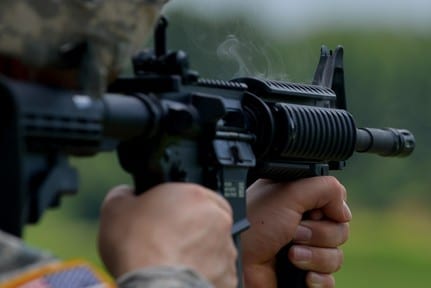Four death row inmates in Tennessee are suing the state in an attempt to choose their own method of execution.
Attorneys say the cohort of condemned would rather be put to death by firing squad than lethal injection or electric chair, the only two options available in Tennessee.
The Tennessean reports that one of the inmates represented in the suit is David Earl Miller. Miller, slated to die in just over a month, is supposed to choose his method of execution today. His attorneys are asking for the procedure to be postponed so a court can hear the case.
The lawsuit, writes The Tennessean, ‘was filed a day after Edmund Zagorski, 63, was executed via electric chair for the 1983 murders of John Dotson and Jimmy Porter. Zagorski robbed, shot and slit their throats after they sought to buy marijuana from him’ a ways north of Nashville.
Zagorski’s lawyers challenged the man’s death sentence on several occasions, filing appeals along with practical challenges to the means of execution. After Zagorski failed to persuade a judge about the illegality of Tennessee’s lethal injection program, his attorneys argued that death by electrocution would be ‘faster.’
Either way, they said, a death sentence is unconstitutional.
The inmates are banking on precedent and practicality to keep their suit afloat. The Tennessean recounts how lawyers for the four inmates have argued that the electric chair “is sure or very likely to inflict a gruesome and torturous death,” since the state lacks protocol on administering an incapacitating and subsequently lethal voltage.
They’ve also pointed to the botched execution of Billy Ray Irick on August 9th—Irick, who was put to death by lethal injection, didn’t die for 20 minutes.

A firing squad is a good alternative, or at least is posited as such by the suit. It says the state has the right firearms, ammunition and trained personnel to carry out a gunfire execution. Moreover, the inmates say Big Buck Shooting Range—on the grounds of Riverbend Maximum Security Institution in Nashville—can “easily accommodate what little equipment is required for an execution by firing squad.”
“The firing squad significantly reduces a substantial risk of unnecessary and severe pain,” alleges the suit, especially when compared to the electric chair and lethal injection. The inmates have asked that Tennessee consider several other choices in the event that firing squads are deemed impermissible. Among the suggestions are the oral administration of lethal drugs or the use of a sedative, pentobarbital.
If the court isn’t willing to discard the current three-drug lethal injection procedure, attorneys have requested that vecuronium bromide be removed from the mixture—they say the chemical’s presence enhances the risk of severe pain before death.
The Tennessean notes that only three states—Mississippi, Oklahoma and Utah—authorize the use of firing squad for death row executions. The most recent use of the technique was in Utah in 2010.
A 2017 Supreme Court ruling denied an Alabama prisoner’s request to die by firing squad. However, Justices Sonia Sotomayor and Stephen Breyer dissented, asking whether it’s appropriate for states to continue using cruel modes of execution.
“Even if a prisoner can prove that the state plans to kill him in an intolerably cruel manner and even if he can prove that there is a feasible alternative, all a state has to do to execute him through an unconstitutional method is to pass a statute declining to authorize any alternative method,” Sotomayor wrote. “This cannot be right.”
Sources
Inmates want to add firing squad as execution method on Tennessee’s death row
Tennessee death row inmates seek firing squad as alternative to electric chair, lethal injection


Join the conversation!